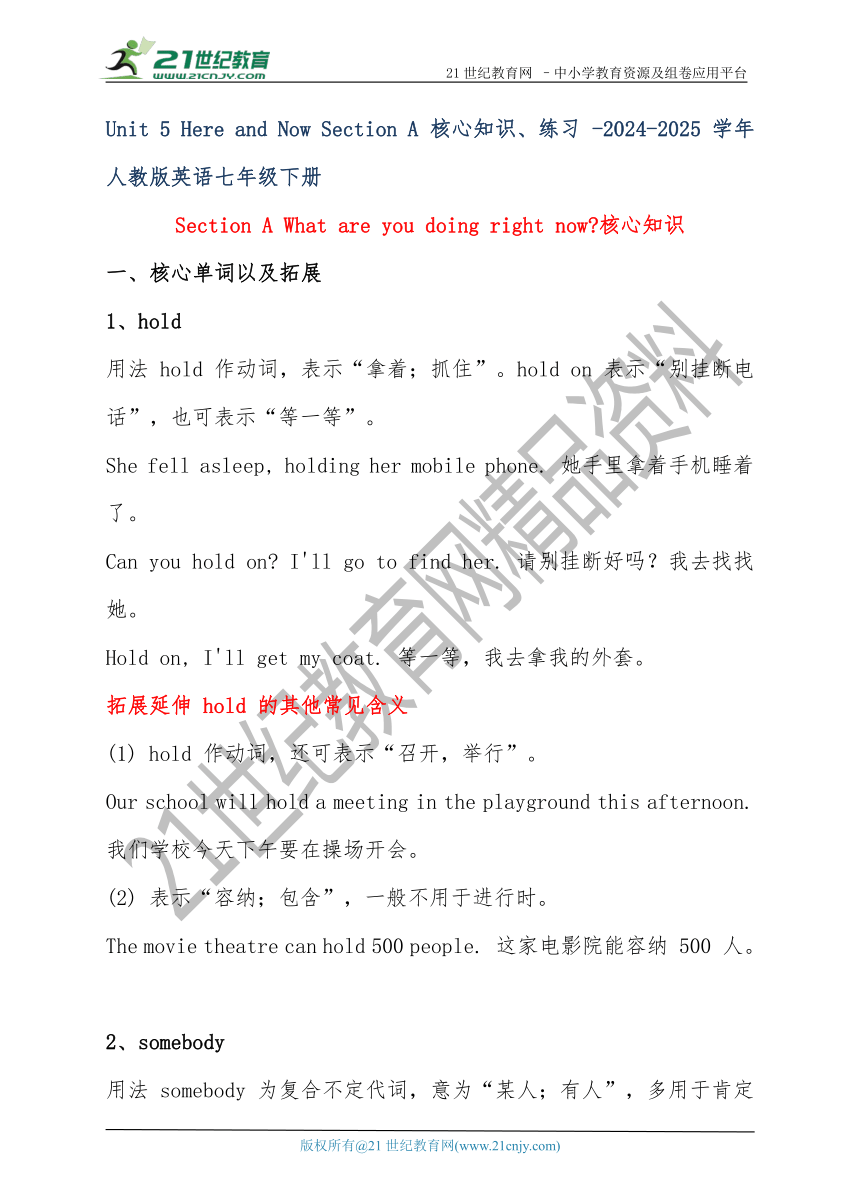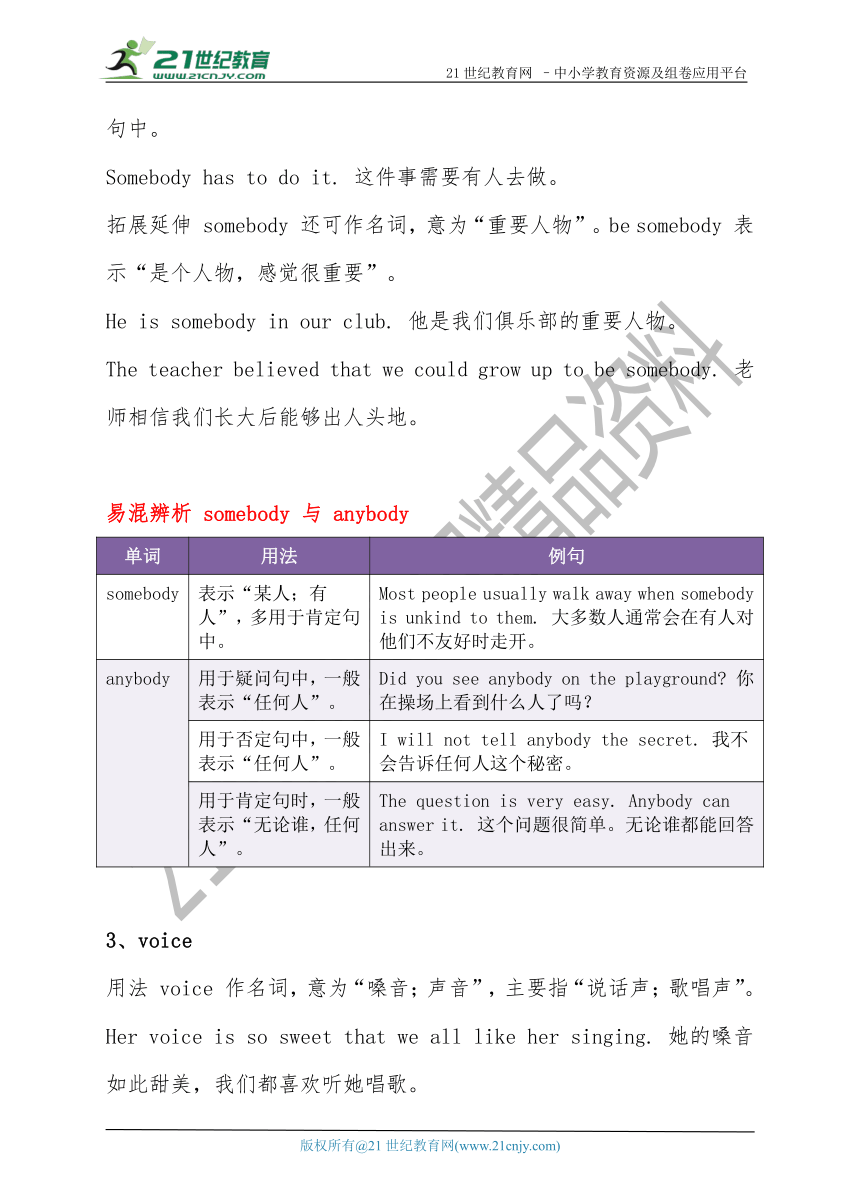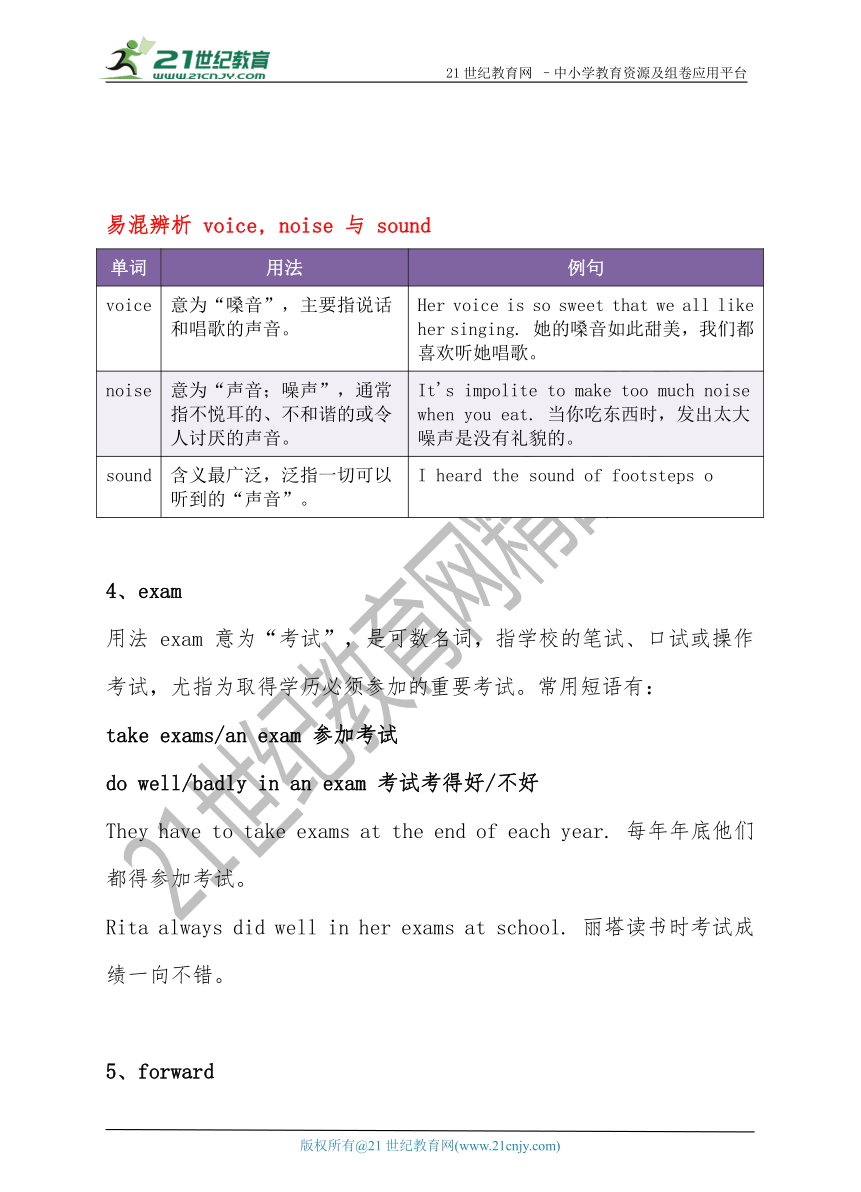Unit 5 Here and Now Section A 核心知识、练习(含答案) -2024-2025 学年人教版英语七年级下册
文档属性
| 名称 | Unit 5 Here and Now Section A 核心知识、练习(含答案) -2024-2025 学年人教版英语七年级下册 |  | |
| 格式 | docx | ||
| 文件大小 | 56.8KB | ||
| 资源类型 | 试卷 | ||
| 版本资源 | 人教版 | ||
| 科目 | 英语 | ||
| 更新时间 | 2025-05-07 12:44:17 | ||
图片预览



文档简介
21世纪教育网 –中小学教育资源及组卷应用平台
Unit 5 Here and Now Section A 核心知识、练习 -2024-2025 学年人教版英语七年级下册
Section A What are you doing right now 核心知识
一、核心单词以及拓展
1、hold
用法 hold 作动词,表示“拿着;抓住”。hold on 表示“别挂断电话”,也可表示“等一等”。
She fell asleep, holding her mobile phone. 她手里拿着手机睡着了。
Can you hold on I'll go to find her. 请别挂断好吗?我去找找她。
Hold on, I'll get my coat. 等一等,我去拿我的外套。
拓展延伸 hold 的其他常见含义
(1) hold 作动词,还可表示“召开,举行”。
Our school will hold a meeting in the playground this afternoon. 我们学校今天下午要在操场开会。
(2) 表示“容纳;包含”,一般不用于进行时。
The movie theatre can hold 500 people. 这家电影院能容纳 500 人。
2、somebody
用法 somebody 为复合不定代词,意为“某人;有人”,多用于肯定句中。
Somebody has to do it. 这件事需要有人去做。
拓展延伸 somebody 还可作名词,意为“重要人物”。be somebody 表示“是个人物,感觉很重要”。
He is somebody in our club. 他是我们俱乐部的重要人物。
The teacher believed that we could grow up to be somebody. 老师相信我们长大后能够出人头地。
易混辨析 somebody 与 anybody
单词 用法 例句
somebody 表示“某人;有人”,多用于肯定句中。 Most people usually walk away when somebody is unkind to them. 大多数人通常会在有人对他们不友好时走开。
anybody 用于疑问句中,一般表示“任何人”。 Did you see anybody on the playground 你在操场上看到什么人了吗?
用于否定句中,一般表示“任何人”。 I will not tell anybody the secret. 我不会告诉任何人这个秘密。
用于肯定句时,一般表示“无论谁,任何人”。 The question is very easy. Anybody can answer it. 这个问题很简单。无论谁都能回答出来。
3、voice
用法 voice 作名词,意为“嗓音;声音”,主要指“说话声;歌唱声”。
Her voice is so sweet that we all like her singing. 她的嗓音如此甜美,我们都喜欢听她唱歌。
易混辨析 voice, noise 与 sound
单词 用法 例句
voice 意为“嗓音”,主要指说话和唱歌的声音。 Her voice is so sweet that we all like her singing. 她的嗓音如此甜美,我们都喜欢听她唱歌。
noise 意为“声音;噪声”,通常指不悦耳的、不和谐的或令人讨厌的声音。 It's impolite to make too much noise when you eat. 当你吃东西时,发出太大噪声是没有礼貌的。
sound 含义最广泛,泛指一切可以听到的“声音”。 I heard the sound of footsteps o
4、exam
用法 exam 意为“考试”,是可数名词,指学校的笔试、口试或操作考试,尤指为取得学历必须参加的重要考试。常用短语有:
take exams/an exam 参加考试
do well/badly in an exam 考试考得好/不好
They have to take exams at the end of each year. 每年年底他们都得参加考试。
Rita always did well in her exams at school. 丽塔读书时考试成绩一向不错。
5、forward
用法 (1) forward 作副词,意为“向前”,修饰动词。
He took two steps forward. 他向前走了两步。
She hurried forward to meet him. 她急忙上前去迎接他。
(2) forward 常用于短语 look forward to,意为“希望”,其中 to 为介词,其后可跟名词、代词或动名词作宾语。
I look forward to your good news. 我期待你的好消息。
I think you should look forward to it. 我觉得你应该期待它。
The children are looking forward to going to the park. 孩子们正盼望着去公园。
6、hope
用法 (1) hope 作动词时,意为“希望”,后面常接动词不定式或 that 从句,也可接介词 for 加宾语。
We hope to see you again. = We hope (that) we can see you again. 我们希望再次见到你。
We are hoping for good weather on Sunday. 我们盼望着星期日天气好。
(2) hope 还可用作名词,意为“希望”,既可作可数名词,又可作不可数名词。
We had high hopes of winning the game. 我们很有希望赢得这场比赛。
When he first arrived in Beijing, he was full of hope for the future. 他初到北京时,对未来充满希望。
易混辨析 wish 与 hope
单词 含义 用法 例句
wish 意为“希望”,表示一种强烈的愿望,但有时难以实现。 wish to do sth. 希望做某事 I wish to travel around the world. 我希望去环游世界。
wish sb. to do sth. 希望某人做某事 Do you really wish me to go with you 你真的希望我和你一起去吗?
wish + that 从句 希望(不大可能的事)…… I wish (that) I were a bird. 我要是一只鸟儿多好啊!
hope 意为“希望”,多表示可以实现或能达到的希望。 hope to do sth. 希望做某事 We hope to hear from you soon. 我们希望不久能收到你的来信。
hope + that 从句 希望…… I hope that my friend can come to my birthday party tonight.
二、重点短语
work on
用法 work on 意为“做;从事”,常用搭配:
work on sth. 致力于某事
work on doing sth. 努力做某事
We had high hopes of winning the game. 我们很有希望赢得这场比赛。
Every weekend you see him working on his car. 每个周末你都能看到他在鼓捣他的汽车。
They are working on finding a cure. 他们正在努力寻找一种治疗方法。
练习
用方框中所给单词填空 (每词限用一次)
voice, sound
1.At the age of six, he couldn't hear any ______.
2.—Who is singing next door
—Sue It sounds like her ______.
somebody, anybody
3.Mark finishes the hard work all by himself. He doesn't ask ______ for help.
4.—Where is my umbrella I put it here just now.
—Maybe ______ took it by mistake.
wish, hope
5.I ______ you to have good luck and get good grades.
6.Remember to e-mail me. All of us ______ to hear from you soon.
参考答案
1. sound
2. voice
3. anybody
4. somebody
5. wish
6. hope
21世纪教育网 www.21cnjy.com 精品试卷·第 2 页 (共 2 页)
版权所有@21世纪教育网(www.21cnjy.com)
Unit 5 Here and Now Section A 核心知识、练习 -2024-2025 学年人教版英语七年级下册
Section A What are you doing right now 核心知识
一、核心单词以及拓展
1、hold
用法 hold 作动词,表示“拿着;抓住”。hold on 表示“别挂断电话”,也可表示“等一等”。
She fell asleep, holding her mobile phone. 她手里拿着手机睡着了。
Can you hold on I'll go to find her. 请别挂断好吗?我去找找她。
Hold on, I'll get my coat. 等一等,我去拿我的外套。
拓展延伸 hold 的其他常见含义
(1) hold 作动词,还可表示“召开,举行”。
Our school will hold a meeting in the playground this afternoon. 我们学校今天下午要在操场开会。
(2) 表示“容纳;包含”,一般不用于进行时。
The movie theatre can hold 500 people. 这家电影院能容纳 500 人。
2、somebody
用法 somebody 为复合不定代词,意为“某人;有人”,多用于肯定句中。
Somebody has to do it. 这件事需要有人去做。
拓展延伸 somebody 还可作名词,意为“重要人物”。be somebody 表示“是个人物,感觉很重要”。
He is somebody in our club. 他是我们俱乐部的重要人物。
The teacher believed that we could grow up to be somebody. 老师相信我们长大后能够出人头地。
易混辨析 somebody 与 anybody
单词 用法 例句
somebody 表示“某人;有人”,多用于肯定句中。 Most people usually walk away when somebody is unkind to them. 大多数人通常会在有人对他们不友好时走开。
anybody 用于疑问句中,一般表示“任何人”。 Did you see anybody on the playground 你在操场上看到什么人了吗?
用于否定句中,一般表示“任何人”。 I will not tell anybody the secret. 我不会告诉任何人这个秘密。
用于肯定句时,一般表示“无论谁,任何人”。 The question is very easy. Anybody can answer it. 这个问题很简单。无论谁都能回答出来。
3、voice
用法 voice 作名词,意为“嗓音;声音”,主要指“说话声;歌唱声”。
Her voice is so sweet that we all like her singing. 她的嗓音如此甜美,我们都喜欢听她唱歌。
易混辨析 voice, noise 与 sound
单词 用法 例句
voice 意为“嗓音”,主要指说话和唱歌的声音。 Her voice is so sweet that we all like her singing. 她的嗓音如此甜美,我们都喜欢听她唱歌。
noise 意为“声音;噪声”,通常指不悦耳的、不和谐的或令人讨厌的声音。 It's impolite to make too much noise when you eat. 当你吃东西时,发出太大噪声是没有礼貌的。
sound 含义最广泛,泛指一切可以听到的“声音”。 I heard the sound of footsteps o
4、exam
用法 exam 意为“考试”,是可数名词,指学校的笔试、口试或操作考试,尤指为取得学历必须参加的重要考试。常用短语有:
take exams/an exam 参加考试
do well/badly in an exam 考试考得好/不好
They have to take exams at the end of each year. 每年年底他们都得参加考试。
Rita always did well in her exams at school. 丽塔读书时考试成绩一向不错。
5、forward
用法 (1) forward 作副词,意为“向前”,修饰动词。
He took two steps forward. 他向前走了两步。
She hurried forward to meet him. 她急忙上前去迎接他。
(2) forward 常用于短语 look forward to,意为“希望”,其中 to 为介词,其后可跟名词、代词或动名词作宾语。
I look forward to your good news. 我期待你的好消息。
I think you should look forward to it. 我觉得你应该期待它。
The children are looking forward to going to the park. 孩子们正盼望着去公园。
6、hope
用法 (1) hope 作动词时,意为“希望”,后面常接动词不定式或 that 从句,也可接介词 for 加宾语。
We hope to see you again. = We hope (that) we can see you again. 我们希望再次见到你。
We are hoping for good weather on Sunday. 我们盼望着星期日天气好。
(2) hope 还可用作名词,意为“希望”,既可作可数名词,又可作不可数名词。
We had high hopes of winning the game. 我们很有希望赢得这场比赛。
When he first arrived in Beijing, he was full of hope for the future. 他初到北京时,对未来充满希望。
易混辨析 wish 与 hope
单词 含义 用法 例句
wish 意为“希望”,表示一种强烈的愿望,但有时难以实现。 wish to do sth. 希望做某事 I wish to travel around the world. 我希望去环游世界。
wish sb. to do sth. 希望某人做某事 Do you really wish me to go with you 你真的希望我和你一起去吗?
wish + that 从句 希望(不大可能的事)…… I wish (that) I were a bird. 我要是一只鸟儿多好啊!
hope 意为“希望”,多表示可以实现或能达到的希望。 hope to do sth. 希望做某事 We hope to hear from you soon. 我们希望不久能收到你的来信。
hope + that 从句 希望…… I hope that my friend can come to my birthday party tonight.
二、重点短语
work on
用法 work on 意为“做;从事”,常用搭配:
work on sth. 致力于某事
work on doing sth. 努力做某事
We had high hopes of winning the game. 我们很有希望赢得这场比赛。
Every weekend you see him working on his car. 每个周末你都能看到他在鼓捣他的汽车。
They are working on finding a cure. 他们正在努力寻找一种治疗方法。
练习
用方框中所给单词填空 (每词限用一次)
voice, sound
1.At the age of six, he couldn't hear any ______.
2.—Who is singing next door
—Sue It sounds like her ______.
somebody, anybody
3.Mark finishes the hard work all by himself. He doesn't ask ______ for help.
4.—Where is my umbrella I put it here just now.
—Maybe ______ took it by mistake.
wish, hope
5.I ______ you to have good luck and get good grades.
6.Remember to e-mail me. All of us ______ to hear from you soon.
参考答案
1. sound
2. voice
3. anybody
4. somebody
5. wish
6. hope
21世纪教育网 www.21cnjy.com 精品试卷·第 2 页 (共 2 页)
版权所有@21世纪教育网(www.21cnjy.com)
同课章节目录
